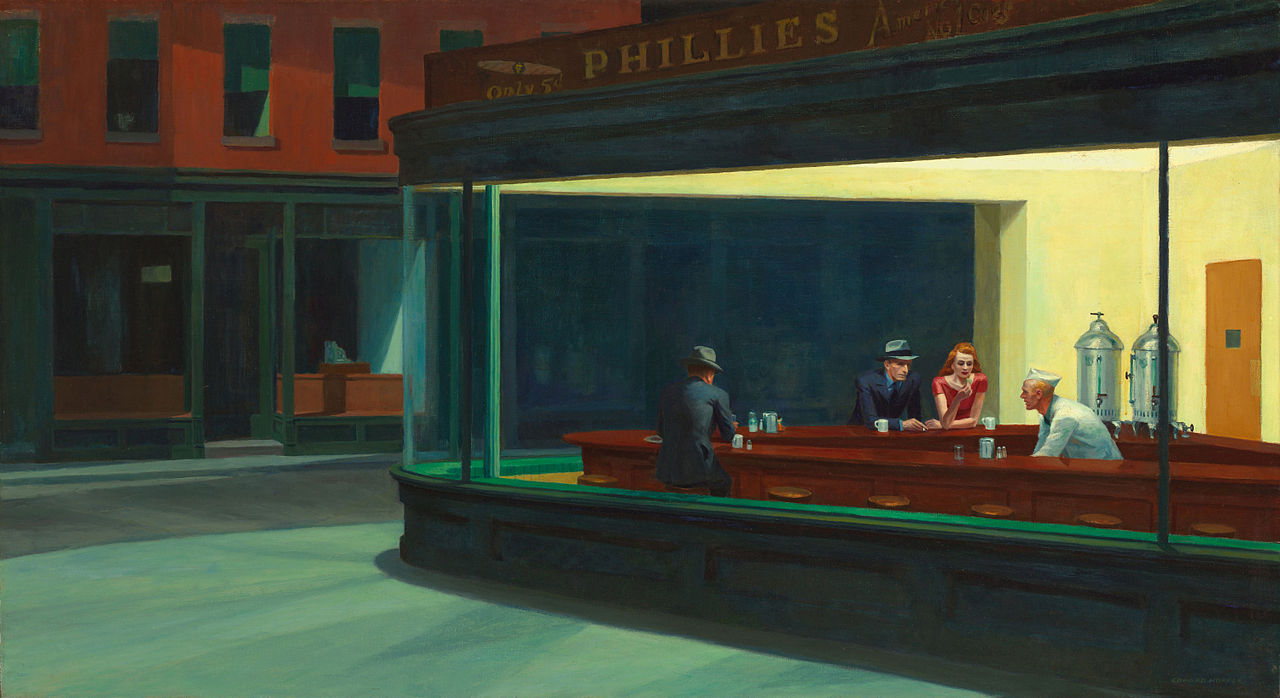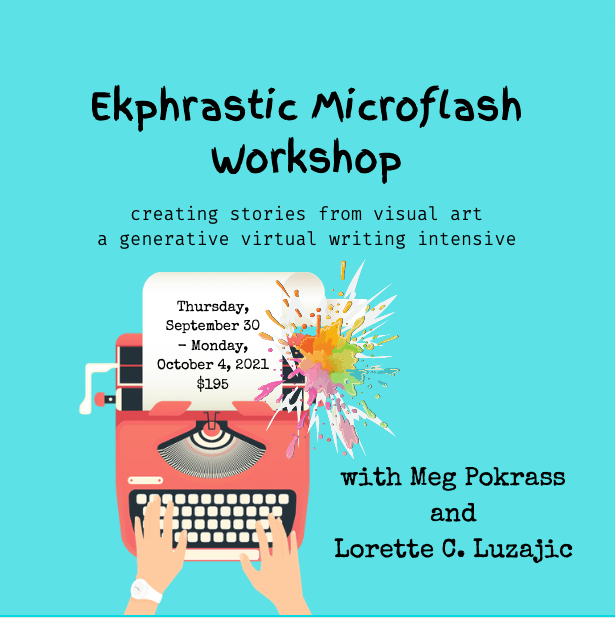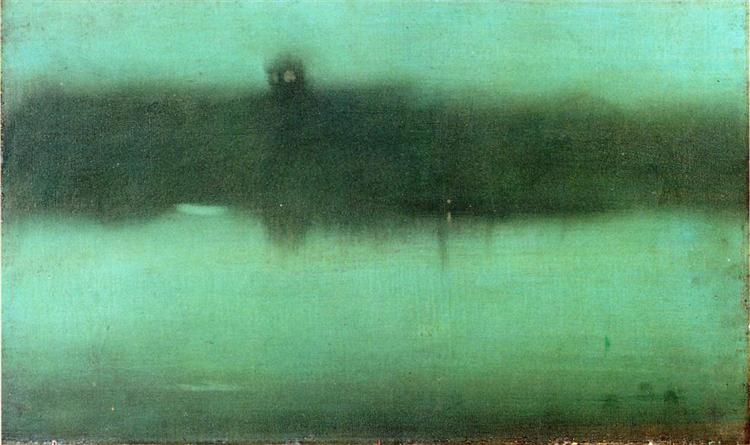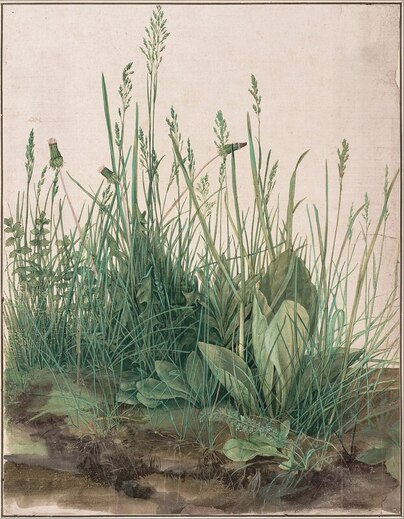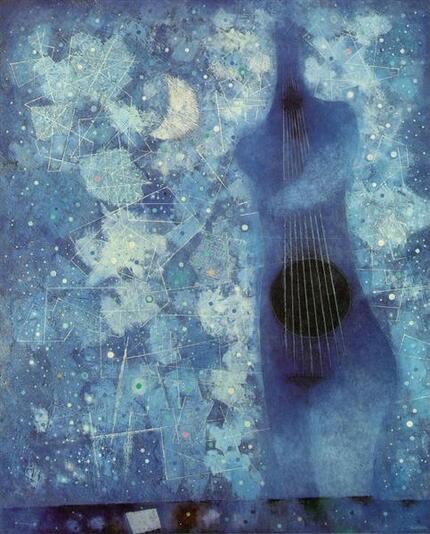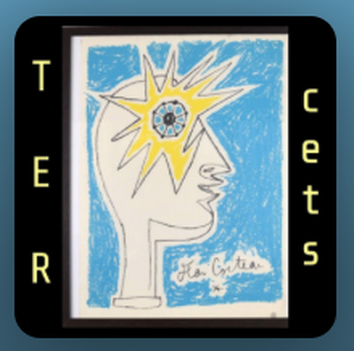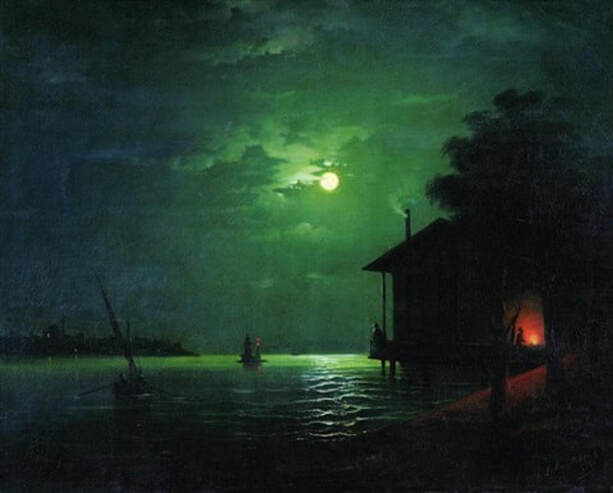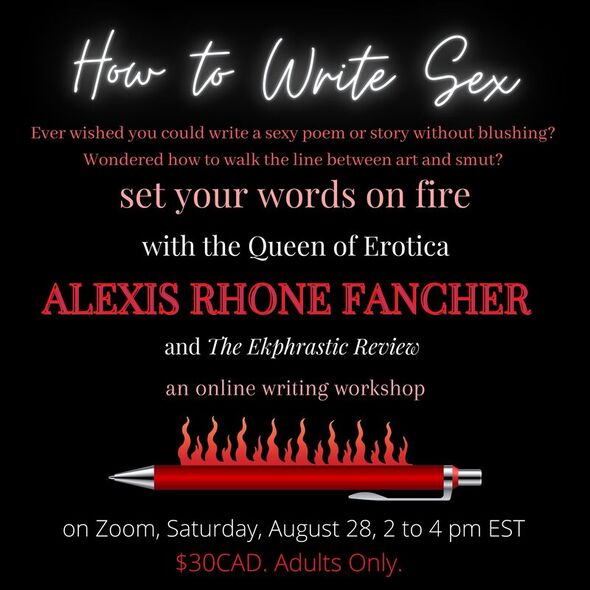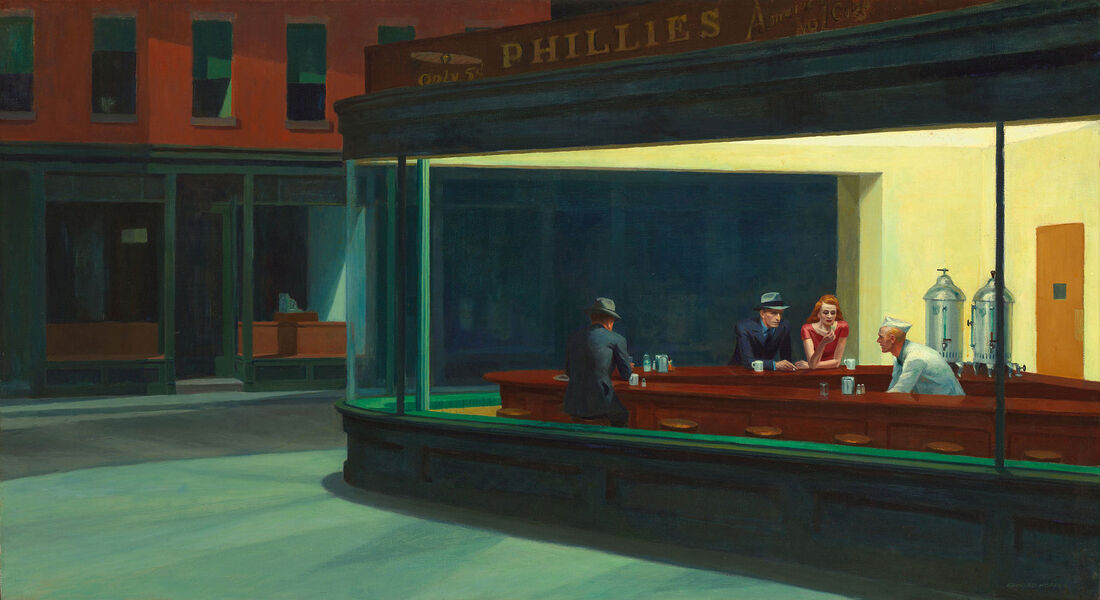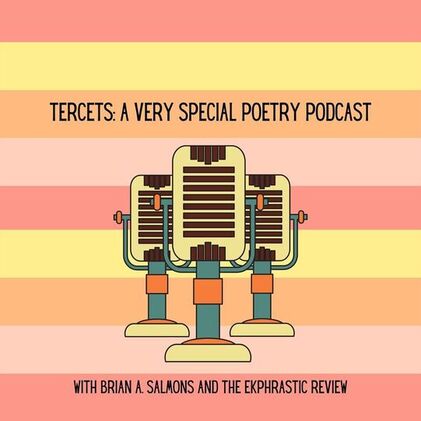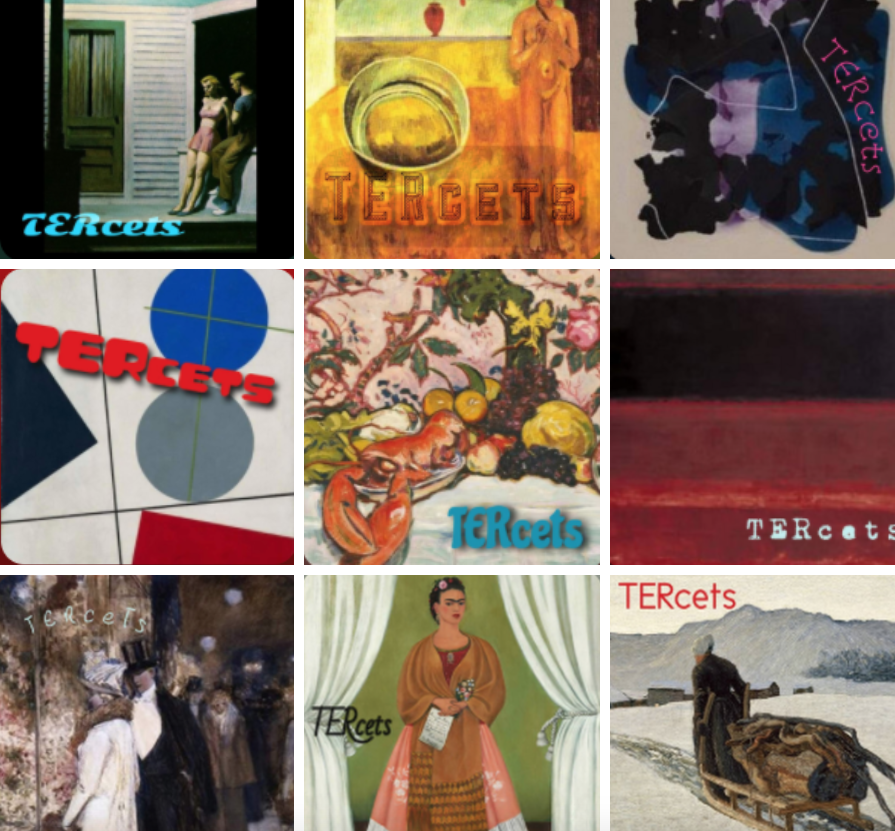|
The Woman in Edward Hopper’s Nighthawks She likes the dark of the diner. She likes this dress best—creamed-cut maroon that exposes her arms. She likes the light, but not the unflattering brightness when pouty lipstick wears off and makeup cakes. She likes this window, a prison that wedges seamlessly and separates two continents: one a story that contains a man leaving his wife, his children. Her not begging or crying and one a street filled with skyscrapers where every turn yields results where storefronts display need. She likes film noir of menace. She likes the smell of stillness, which is crazy and faint. Like her hair with ashes or henna. She likes a gas station opened. The making of what must be time on the move and his hands no longer moving over her. She likes January. Sidewalks aren’t stressed with clarity. So slushy, worse than skim milk. She likes theater. Dreams so wide with men, circling in their hushness, sipping their coffee or committed to murder. John Milkereit John Milkereit lives in Houston and has completed a M.F.A. in Creative Writing at the Rainier Writing Workshop. His work has appeared in various literary journals including San Pedro River Review, The Orchard Street Press, and from several previous writing challenges from The Ekphrastic Review. Lamar University Press published his last collection of poems entitled Drive the World in a Taxicab. He is a 2021 Pushcart nominee.
0 Comments
We had such a great time with so many talented writers at our first collaborative workshop that Meg Pokrass and I have decided to host another ekphrastic microfiction workshop.
Click here for more information or to enrol. Sign up today to avoid disappointment- our last one sold out quickly! Water World Her husband was sitting near the window, holding the gun again. Talking to God on the ceiling, wishing God had treated him differently. The husband had become so much like her father, thinking it all came down to money. How his heart had never opened up to her because he was poor. How wrong to be trapped in a life like this, he said. She was always looking for home in his eyes, but as the evening gathered, her heart felt dry and alone. Green water was sloshing up against their house, it never stopped sloshing against the doors. It’s nobody's fault, she said. And this is why he pointed the gun toward her and then pointed at the bruise of early evening and said, I'm letting you swim away. And finally, this is how she did it—got herself into a skinny old boat, the boat that used to belong to her father—and let the green water take care of her. Meg Pokrass Read Meg's story from a Renoir painting. www.ekphrastic.net/ekphrastic-journal/rose-by-meg-pokrass Meg Pokrass is the author of eight flash fiction collections, an award-winning collection of prose poetry, two novellas-in-flash, an award winning collection of prose poetry, and a 2020 collection of microfiction, "Spinning to Mars" which won the Blue Light Book Award. Her work has appeared in Electric Literature, Washington Square Review, Smokelong Quarterly, Split Lip and McSweeney'shas been anthologized in New Micro (W.W. Norton & Co., 2018), Flash Fiction International (W.W. Norton & Co., 2015) and The Best Small Fictions 2018 and 2019. She serves as Founding Co-Editor of Best Microfiction 2020 and Festival Curator of Flash Fiction Festival U.K. and teaches flash fiction online and in person. Find out more at megpokrass.com. Great Piece of Turf after Diane Seuss’ poem Young Hare This is the companion to the other one the one we like better because a lovely brown rabbit twitches instead of a mud flat of weeds sitting inert The one we like better is not a fist of green cock’s foot, creeping bent, a mud flat of weeds sitting inert smooth meadow-grass, star-shaped daisy, dandelion like a bunched up fist including hounds-tongue, yarrow, plantain yes, meadow-grass with daisies and blowball an untidy, higgledy-piggledy, mishmash of gypsy flower, milfoil, fleawort hodgepodge, swimming green stems untidy, higgledy-piggledy, mishmash with wildly tangled roots exposed hodgepodge, swimming green stems like the muscles in a hand Leonardo sketched with wildly tangled roots exposed this verdant chaos is painted by you using the muscles in your hand Albrecht, a sign that your mind was able to delineate this verdant chaos you painted but not to order it, not in this case Albrecht, a sign of your complex mind it is oh so lovely this detailed scrub of wild weeds not ordered, not organized, not gathered I can even smell the peppery must of dandelion Lovely and detailed is this scrub with the waft of rosemary in yarrow peppery must of dandelion the drift of mint from daisies The scent glide in yarrow the green colours the olives, the lime drift of mint chartreuse with its blinding shine, the green colours the olives and lime the depth of Kelly tongue- touched sea foam chartreuse with its shiny pistachio. I can taste them too the depth of Kelly tongue –touched sea foam like melting green ice cream the taste of chocolate mint cookies and while you didn’t sketch a secret window in the melting ice cream leaves The glint on the meadow grass contains no secret sketch like the window reflected in the rabbit’s eye the glint on the meadow grass mirrors back to us what we want to see in the window in the hare’s eye ourselves looking in Amy Phimister Amy Phimister retired in Sturgeon Bay, Wisconsin. She is a member of the Wisconsin Fellowship of Poets and has been published by WFOP, Yardstick Books, several anthologies and The Ekphrastic Review, and was twice a finalist for the Hal Prize. She published a children’s book in 2021 called ABC the Animals, a scavenger hunt through the alphabet. Night Flight Imagine, we were half bird. Our flight is fleeting, yes, but still we sometimes slipped into the sky. You are new to this world and don’t know the half of it. Even so, you show us the way. How to slay the dragons, how to turn the page. We gnaw on plastic poultry legs and rubbery bananas and you fake punch a random price into a toy cash register, hold your grubby paw out for my pocketful of coins. I wouldn’t have wished the world on you, but here you are. You have arrived, starry eyed and surprised. You have a blue-green bike and a matching bow in your hair. You love cucumbers and mangos and the frilliest pajamas. Every word is a victory and you’re starting to string them together. We were dancing in our sock feet in your toy room, stripes and polka dots a blur in your swirl. If only we had more ice cream, you say when I pull out the goodnight story. You stall for time before lights out and I guess it’s the same for all of us. Lord, just one more year, just one more day, just one more hour. But soon you are drifting through the clouds and I watch sleep soften your small face. The moon is your witness, I think, kissing you where she does on your dimple. I cover you in a thin sheet, watch your shifting shoulders, small wings dark as earth. Lorette C. Luzajic This first appeared in Gyroscope Review, and in the author's recent book, Winter in June (Mixed Up Media Books, 2021). Lorette C. Luzajic is an artist, writer, and editor based in Toronto, Canada. The selected responses to the Garabet Yazmaciyan ekphrastic writing challenge are up.
Congratulations to those selected and to everyone who participated. Click here to read these wonderful poems and stories. Oh, yes, we did... Alexis Rhone Fancher, author of Erotic: New and Selected, is our guest judge for the Ekphrastic Sex contest. We are absolutely thrilled that she is joining us for a very special online workshop on How to Write Sex!!!!! Alexis will share some of her ekphrastic sex poetry, tell us about her experiences as an erotic writer, and offer tips you can use in your own practice to set your words on fire! The workshop is Saturday, August 28, 2021 at 2 pm to 4 pm EST. $30CAD. Adults only. Alexis Rhone Fancher is the author of Erotic: New and Selected (NYQ Books); How I Lost My Virginity to Michael Cohen & other heart stab poems (Sybaritic Press); Enter Here (KYSO Flash), and other books. Since 2013, she has been nominated 29 times for the Pushcart Prize, 1 Best Short Fiction award, 1 Best Micro-Fiction award, and 6 Best of the Net awards. In 2018 she won The Pangolin Prize for Poetry. Her poem, “when I turned fourteen, my mother’s sister took me to lunch and said:” was chosen by Edward Hirsch for inclusion in The Best American Poetry of 2016. Her poems and flash fiction have been published in over 200 literary magazines and journals, including: RATTLE, Verse Daily, VOX POPULI, Slipstream, Spillway, The American Journal of Poetry, The Pedestal Magazine, The MacGuffin, Hobart, The Ekphrastic Review, and more. She is also a photographer, known for her studio portraits of writers and her California street photography, published world wide. She and her husband live and collaborate on the bluffs of San Pedro, CA, twenty five miles from downtown L.A. They have a spectacular view. Alexis Rhone Fancher, from The Fem: "I write about women like me, women who own their sexuality and take responsibility for their choices. It may seem I'm writing about sex, but really, I'm writing about power. Who has it. How to get it. How to wield it. How to keep it." Centoizing Alice Neel “People Come First,” Metropolitan Museum of Art March 22 - August 1, 2021 Alice Neel said, I am a collector of souls. She painted the famous Andy Warhol so we could see him fizzled and battle scarred. She painted the local cabdriver Abdul Rahman so we could get caught in his bearded dignity and the net of his chest hair. She painted Margaret Evans Pregnant, bare belly bulging with imminent birth, ready to face hard labor. Alice Neel said, I have this overweening interest in humanity. She painted David Bourdon and Gregory Battcock in times still fraught for their relationship. David is tightly pressed into a business suit, while Gregory lounges legs splayed in his underwear, with red socks signaling no stops or caution needed. Alice Neel lived for decades in Harlem. She painted Two Girls, Spanish Harlem and The Black Boys. Their somber eyes insist -- we matter, our hopes matter, don’t leave us behind. Jeff Neal, surviving brother, at the Met for a private viewing, reflects, “she was looking at two ghetto children from uptown and bringing out the beauty in us.” Alice Neel said, when I painted, I was completely and utterly myself. She painted her nude Self Portrait when she was eighty. No apologies for her sagging belly and all it had stomached. Alice Neel said, the more experience you have, the better it is... unless it kills you, and then you know you have gone too far. Elane Gutterman Elane Gutterman, a health researcher, began her poetry journey about a decade ago. Her poems have appeared in Kelsey Review, Patterson Literary Review, U.S. 1 Summer Fiction Issue and The New Verse News. Tides of Expectation, her first poetry book, will be published by Kelsay Press in 2022. Nighthawks- Again I can’t look at Nighthawks—again. I mean again and again. I mean I can but it’s like the French say, de trop, trop traité, too treated, trop trafiqué, like drug traffic, promising an inner beam but into the nothingness instead of the light, into that terrible fluorescent gaze from nowhere. I’m not trying to sound like Ferlinghetti or Sartre or some Kerouac roadie. The scene I’ve seen de trop, so much I don’t SEE it. But I’ve tasted it, the acid-percolated coffee. I’ve felt it, the bad date who stares straight ahead. I’ve touched it, my father’s old felt hat, empty. I’ve smelled it, cook’s sweaty palms. Endless waiting for the light that never comes and never leaves. Michael Lewis-Beck Mike Lewis-Beck writes from Iowa City. He has pieces in American Journal of Poetry, Apalachee Review, Cortland Review, Chariton Review, Ekphrastic Review, Guesthouse, Pilgrimage, Taos Journal of International Poetry and Art, and Wapsipinicon Almanac, among other venues. He has a book of poems, Rural Routes, recently published by Alexandria Quarterly Press. TER: You’re a poet who has been involved with The Ekphrastic Review for some time, as our social media manager for Facebook and as a contributor. We’d love to know more about your writing life. Brian A. Salmons: My writing life has ebbed and flowed ever since middle school when I got my first guitar and began writing my own songs and lyrics. I took it very seriously when I was 14, so I count that as the start of it all. I wrote a little poetry in high school, but didn’t really start until I was in my 20s. All of it ‘for the desk drawer’ as they say. Just making sense of life. Then I stopped. Got married, started a family. It wasn’t until my 40s that I took it up again and decided to get it out there for people to read. My first poem was published in 2017 in a now-defunct online lit mag called Man in the Street Magazine. I haven’t published any chapbooks or books yet, although that’s definitely a goal. Being a spouse and a parent is a big responsibility, and I’ve realized that I need a creative outlet to help me handle that. So I make time for it, and I’m happier for it. What does ekphrastic writing mean to you? Tell us about your relationship with visual art. All art is referential to some degree, right? As a teenager, I fell in love with blues music, old blues from the 1920s and 1930s, Robert Johnson particularly. Their music sounded so pure and, to my mind, was the epitome of American cultural originality. But he and his fellow travelers didn’t just make up those songs. They were part of a tradition that borrowed from other musical practices from Africa and the British Isles. Music evolves from earlier forms of music. Variations on a theme. I understood this when I wrote music, and that carried over into my poetry. When I write, I need to listen to music. Some people need silence, or the buzz of a public space, but I need music. Whatever else inspires my writing, there is always a song there. And so when I learned of ekphrastic writing, it made total sense! Ekphrastic writing differs from critique in that ekphrastic writing doesn’t need to be “about” the work of art. Art is instead an inspiration, a prompt. It can bring a memory to the surface, or give new meaning to a well-trod one. It can spark the imagination and evoke a story that continues beyond the frame, the screen, the gallery. Ekphrastic writing is great for writers who like something to start with. It is a form of sorts, in that it constrains the writing, even if only by providing a point of departure or a trajectory. My belief is that good writing is not the product of genius or any sort of blessed originality. It always stands on others’ shoulders. I think writers should strive to be conscious of the sources of their inspiration, and to purposefully seek other inspiration. Ekphrastic writing embodies that value. Tell us about the evolution of TERcets. How did the podcast come into existence? I used to do a “podcast” using Facebook Live Audio called Brian and the Night (2017-2020). The premise was that I just sat on my back porch, at night, and read poems that I liked. It was fun for a while, but I could count my listeners on one hand and got discouraged. During those years I became involved with the Ekphrastic Review, and it eventually dawned on me that my time would be better spent doing a podcast that served an existing literary magazine, like yours. Thankfully, you loved the idea, and TERcets was born! Please explain the podcast name. “TER” is an acronym for The Ekphrastic Review, and I knew I wanted to include that in the name somehow. While perusing a list of words that begin with “Ter”, I was shocked, and more than a little fortunate, to find one related to poetry: “tercet”. A tercet is a poetic unit of three lines. From there, it was an easy decision to limit each episode to the very practical number of three pieces of writing. I am still madly in love with the name. Do you personally prefer listening to poetry and stories read aloud than to reading them? The irony of ironies is that I do not prefer listening to people read. I’ll qualify that by explaining that I prefer listening to recordings of readings over going and watching people read in person. I think it’s just the way my brain works: it is difficult to digest auditory information, particularly in a social context. That’s true for many people, but certainly not all, therefore I’m committed to producing TERcets knowing that I am making a small portion of the fantastic writing that The Ekphrastic Review publishes available in a format that will appeal to more people. I listen to a lot of other literary podcasts. And while I don’t often come away from an episode having digested everything presented, there is almost always that one piece of writing with that one line or lines that made me say “Mmm” out loud. That’ll stay with me and influence my thinking, and writing. I also do my best to share the piece on social media and tag the writers and publisher, to help promote their writing and just start a discussion. I hope TERcets does this for our listeners and The Ekphrastic Review’s writers. How do you choose the selection of works for each podcast? There is no real system. When I am ready to select works, I go to The Ekphrastic Review’s website and just start reading the most recent posts. I look for longer works that take a few minutes to read, but not too long - each episode is about 12-15 minutes long. And obviously I pick what appeals to me. There are many, many excellent works that do not make it into TERcets and, although I hate to admit it, that’s partly because I don’t read everything that The Ekphrastic Review publishes. There is just so much! I think it is a testament to the magazine’s popularity and importance to the ekphrastic writing community that it features such an abundance of good writing. What can you say to someone who hasn’t tuned in yet, or who says they personally prefer reading poetry or fiction instead of listening? I say that I totally get that, but give it a try anyway. The episodes aren’t very long, so you can easily listen to one while doing some minor chore around the house, or on a quick errand in the neighborhood. Like I said before, you don’t need to absorb every reading in the episode to get something from it. Often it’s just that one poem or story, or just one line, that will sink in and inspire. I am always glad when that happens to me, especially after I’ve started an episode and I’m starting to wonder why I’m still listening. Then, a little surprise! Also, every episode features 3 songs - in the interludes between readings - by independent musicians. I strive to incorporate good music that you’ve probably never heard before into the podcast, because music is just that important to me. So, even if you don’t like one of the readings, you might discover a new band or singer. Just sweetening the pot a little. What are your plans and hopes for the future of the podcast? I can’t imagine changing anything else about the podcast. I recently started having the writers send recordings of them reading their works themselves, instead of me reading them all. The feedback on that change has been great! I would like to publish episodes more often (right now it’s about a month between episodes), but I can’t make the time for that right now. I’ve considered doing special episodes with interviews and such, but we’ll see. My hope, and main goal, is that as we gain listeners, that’ll create more buzz on social media, which will feed back into The Ekphrastic Review’s submissions, meaning even more awesome writing for the website. TERcets exists to support The Ekphrastic Review. So as long as it does that, and our listeners enjoy it, we’ll keep it going. ** Begin exploring the podcasts here. Read an ekphrastic Indonesian poem and the translation by Brian A. Salmons here. Check out Brian's picks from the ekphrastic archives for Throwback Thursday. |
The Ekphrastic Review
COOKIES/PRIVACY
This site uses cookies to deliver your best navigation experience this time and next. Continuing here means you consent to cookies. Thank you. Join us on Facebook:
July 2024
|
